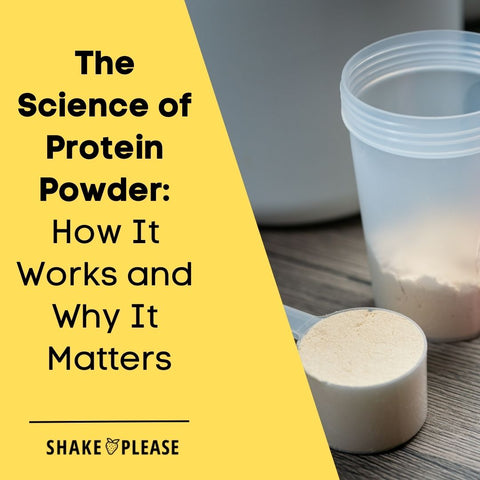Embrace the science-backed approach to customize your protein powder intake for the best results.

Discover the power of protein powder as we unlock its nutritional secrets and how it benefits your body.
Protein powder has become increasingly popular in recent years, as more and more people recognize the importance of protein in maintaining a healthy lifestyle. Whether you're an athlete looking to build muscle, a fitness enthusiast trying to lose weight, or someone following a vegetarian or vegan diet, protein powder can be a valuable addition to your nutrition regimen. But what exactly is protein powder, and how does it work in the body?
In this article, we will explore the science behind protein powder and why it matters for your overall health and well-being.
The Importance of Protein in the Body
Protein is an essential macronutrient that plays a crucial role in various bodily functions. It is the building block of tissues, organs, enzymes, and hormones, and is involved in the repair and growth of cells.
Protein also helps regulate metabolism, supports immune function, and aids in the transportation of nutrients and oxygen throughout the body. Without adequate protein intake, our bodies would not be able to function optimally.
This is where protein powder comes in.
Whey Protein Smoothies: Science Based Convenience
In the ever-evolving world of nutrition, whey protein smoothie delivery has emerged as a convenient and innovative way to harness the benefits of protein powder. As we explore the science of protein powder, it becomes evident that the quality and timing of protein consumption play a crucial role in maximizing its effects on muscle growth and recovery.
Whey protein, renowned for its high bioavailability and rich amino acid profile, stands out as an ideal choice for athletes and fitness enthusiasts. With whey protein smoothie delivery services, individuals can now effortlessly enjoy the goodness of this nutritional powerhouse.
By delivering freshly blended protein-packed smoothies straight to your doorstep, these services ensure that you never miss out on the essential nutrients your body needs to thrive. Whether it's a post-workout refuel or a quick and satisfying snack, whey protein smoothie delivery brings science-based nutrition right into your hands, supporting your fitness goals and overall well-being with each delightful sip.
What is Protein Powder Made Of?
Protein powder is typically made from various sources, such as whey, casein, soy, or pea protein. These sources are processed to remove the excess fat and carbohydrates, leaving behind a concentrated form of protein.
The resulting powder can then be mixed with water, milk, or other liquids to create a convenient and easily digestible source of protein.
How Protein Powder is Digested and Absorbed
Once consumed, protein powder is broken down into amino acids, which are the building blocks of protein. These amino acids are then absorbed into the bloodstream and transported to various tissues and organs in the body.
The speed at which protein powder is digested and absorbed can vary depending on the source of protein.
For example, whey protein is quickly digested and absorbed, making it an ideal choice for post-workout recovery, while casein protein is slower to digest, providing a sustained release of amino acids over a longer period of time.
Different Types of Protein Powder
There are several different types of protein powder available on the market, each with its own unique characteristics and benefits.
Whey protein, derived from milk, is one of the most popular options, thanks to its high bioavailability and complete amino acid profile.
Casein protein, also derived from milk, is another common choice, known for its slow digestion and sustained release of amino acids.
Soy protein, made from soybeans, is a popular option for vegetarians and vegans, as it is a complete plant-based protein. Pea protein, derived from yellow split peas, is another plant-based option that is easily digestible and hypoallergenic.
Benefits of Using Protein Powder
The use of protein powder offers a range of benefits, regardless of your health and fitness goals. Firstly, protein powder provides a convenient and easily accessible source of protein, especially for those who may struggle to meet their daily protein requirements through whole foods alone.
It can be particularly beneficial for individuals with increased protein needs, such as athletes or those recovering from injuries. Protein powder is also highly versatile and can be incorporated into a variety of recipes, such as smoothies, pancakes, or energy bars, to increase the protein content of your meals and snacks.
Protein Powder and Muscle Building
One of the primary reasons individuals use protein powder is to support muscle building and recovery. When combined with regular resistance training, protein powder can help promote muscle protein synthesis, which is the process by which new muscle tissue is formed.
The amino acids derived from protein powder provide the necessary building blocks for muscle repair and growth, helping to optimize the results of your workouts. It is recommended to consume protein powder within 30 minutes to an hour after your workout to maximize its benefits for muscle recovery.
Protein Powder for Weight Loss
In addition to its muscle-building benefits, protein powder can also be a valuable tool for weight loss. Protein is known to increase satiety and reduce appetite, which can help prevent overeating and cravings. By incorporating protein powder into your diet, you can increase your protein intake without significantly increasing your calorie intake.
This can help support weight loss efforts by preserving lean muscle mass and promoting fat loss. Additionally, protein powder can be a convenient and portable option for those on the go, making it easier to stick to your diet plan and avoid unhealthy food choices.
Protein Powder for Vegetarian and Vegan Diets
For individuals following vegetarian or vegan diets, finding adequate sources of protein can be a challenge. Protein powder can be a valuable addition to these diets, providing a complete source of protein that is free from animal products.
Plant-based protein powders, such as soy or pea protein, offer all the essential amino acids needed by the body. They can help ensure that vegetarians and vegans meet their daily protein requirements and support their overall health and well-being.
Protein Powder and Recovery After Workouts
Intense exercise places stress on the muscles and results in muscle damage. Proper recovery is crucial to allow the muscles to repair and grow stronger. Protein powder can play a key role in post-workout recovery by providing the necessary amino acids to support muscle repair and reduce muscle soreness.
Consuming protein powder after a workout can help replenish glycogen stores, reduce inflammation, and accelerate the recovery process. Adding carbohydrates to your protein shake can further enhance recovery by replenishing energy stores and promoting glycogen synthesis.
HOW PROTEIN SHAKES ENHANCE ATHLETIC PERFORMANCE
Potential Side Effects of Protein Powder
While protein powder can offer numerous benefits, it is important to be aware of potential side effects. Excessive protein intake, especially from supplements, can put a strain on the kidneys and liver, as they are responsible for processing and eliminating excess protein. This can be a concern for individuals with pre-existing kidney or liver conditions.
Additionally, some protein powders may contain added ingredients, such as artificial sweeteners or fillers, which can cause digestive issues or allergies in certain individuals. It is important to choose a high-quality protein powder and follow the recommended dosage guidelines to minimize the risk of side effects.
Choosing the Right Protein Powder for You
With so many protein powder options available, it can be overwhelming to choose the right one for your needs. Consider factors such as your dietary preferences, goals, and any potential allergies or intolerances.
If you tolerate dairy well and are looking for a fast-digesting protein, whey protein may be the best choice. If you follow a vegetarian or vegan diet, plant-based protein powders like soy or pea protein can be suitable options.
It is also important to consider the taste, texture, and mixability of the protein powder, as these factors can greatly affect your overall satisfaction and adherence to using it.
FUEL YOUR DAY: PROTEIN-PACKED BREAKFAST IDEAS
Conclusion
Protein powder is a valuable tool for individuals looking to optimize their health and fitness goals. With its convenience, versatility, and wide range of benefits, protein powder can be a valuable addition to any diet.
Whether you're looking to build muscle, lose weight, or support a vegetarian or vegan lifestyle, protein powder can help you meet your protein requirements and support your overall well-being. However, it is important to choose a high-quality protein powder, consume it in moderation, and consult with a healthcare professional if you have any pre-existing health conditions.
By understanding the science behind protein powder and its role in the body, you can make informed decisions to enhance your nutrition and achieve your desired outcomes.
The science of protein powder is clear – it can be an effective tool in achieving optimal health and well-being.





